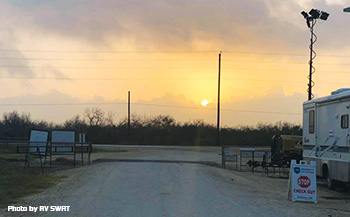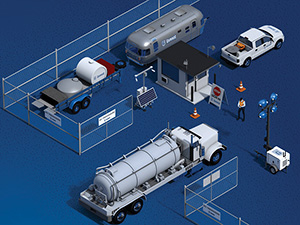Gate Guarding Workamper Jobs Provide Profit, Adventure
Gate Guarding Workamper Jobs Provide Profit, Adventure
by Greg Gerber
Workampers looking to make a bunch of money in a relatively short period of time may want to consider working as a gate guard for JG Security or Guard 1 Services.
Gate guarding is one of the most lucrative positions available to Workampers where they can earn between $4,500 and $6,000 per month, per couple. They often split the workload in a way that enables one person to always be available to greet vehicles so the other person can sleep or run errands.
Due to the nature of the job, gate guarding is ideally-suited for couples; however, there are occasionally some opportunities that could accommodate a solo Workamper working 12-hour shifts. In those instances, the solo guards would often stay at an RV park and commute to a job location to staff a guard shack.
 Gate guards are generally “on duty” 24 hours a day, but they are not working around the clock. They are positioned at the entrance to oil fields, green energy plants, construction sites and other areas where private security is needed. Guards control access to the site to ensure only authorized people and vehicles are in the area.
Gate guards are generally “on duty” 24 hours a day, but they are not working around the clock. They are positioned at the entrance to oil fields, green energy plants, construction sites and other areas where private security is needed. Guards control access to the site to ensure only authorized people and vehicles are in the area.
“They are not armed, nor are they involved in any type of law enforcement activities, such as attempting to intercept an actual incident,” Jessica Heisler, with JG Security, said. “If gate guards detect any suspicious activities, they report it to the company office or to local law enforcement.”
The work is relatively simple. When a vehicle pulls up to the gate, whether it is entering or exiting the area, a guard checks the identification or credentials of the driver as well as passengers, records any DOT numbers displayed on the truck, and uses a tablet computer to enter information into a log file. The guard also photographs the vehicle and whatever is on a truck before reminding the driver of speed limits, special rules or hazardous situations.
The photographs help client companies know who is coming onto the property and what equipment is leaving. There have been instances where lost equipment was recovered by reviewing photos of vehicles to see which truck was carrying a specific tool, James Jenkins, the recruiting coordinator from Guard 1 Services, said.
Working as a gate guard is different from most other Workamping jobs. It is not a position that starts at a specific time and ends at a specific time. Sometimes the job sites change location and Workampers will need to move to the new site. So, the position requires a level of flexibility that may not be necessary for other types of jobs.
“A normal worker is expecting to be hired for a specific job at a specific place that starts at a specific time. And that is just not what gate guarding is,” Jessica explained. “There are a lot of opportunities for people to make an exceptional amount of money, but they need to bring a level of flexibility most full-time RVers already have.”
Although guards must be available around-the-clock, many workdays start around 5 a.m. and continues until 7 or 8 p.m. That’s because most gates are at oil fields and shifts change for employees at 6 a.m. and 6 p.m, James said. Daytime traffic could be vendors coming in for meetings or delivering supplies, like drill pipe, chemicals, water and other equipment involved in drilling.
“Trucks, water haulers and some oil tankers may show up after midnight, but mainly around 1 or 2 a.m.,” he added. “The truck driver will normally notify the guard that he is coming back in two hours. That way the guard can go back in, kick back and even get a little nap before having to come back out.
“It's not like you can hear an alarm when you're sleeping, then get dressed and go to greet the vehicle. Truck drivers are probably honking the horn after a few seconds of waiting,” said James.
Workampers do not need to be sitting outside waiting for vehicles to show up. They can stay inside their RVs and run outside to greet vehicles when they approach the gate.
 “It's a very relaxed job and not very laborious, but we want guards to remain alert and vigilant about what’s going on around the gate,” Jessica said. “I encourage people to think of it moreso as being accountable for the length of your shift, versus actively working for that entire time.
“It's a very relaxed job and not very laborious, but we want guards to remain alert and vigilant about what’s going on around the gate,” Jessica said. “I encourage people to think of it moreso as being accountable for the length of your shift, versus actively working for that entire time.
“You're not chopping wood, shoveling snow or cleaning restrooms,” she added. “Depending on your setup, you're really just getting out of your outdoor chair, greeting drivers, checking trucks in or out, and then returning to whatever activity you were doing to pass the time.”
It is important that guards greet and clear vehicles quickly because the drivers are often on deadline to get supplies or equipment to a job site. Guards must also be conscious of traffic backups causing a dangerous situation on highways leading to the job sites.
“Guards keep the gate closed at all times, report suspicious activity to the proper party, and maintains a constant surveillance of the gate to ensure safety of the surrounding roadway. If the gate is off a major highway, guards need to ensure the big, heavy trucks are in line to get off the road,” James said.
To make their jobs easier, and give them plenty of time to get outside, many Workampers purchase special sensor equipment that detect approaching vehicles and relay a signal into the RV. The cost to buy the sensors and alarms is around $65 per unit and several are often needed.
Special Requirements
Gate guards in Texas will need to be licensed as non-commissioned security officers by the Texas Department of Public Safety, James explained. That consists of taking a six-hour online course, uploading the certificate of completion and getting fingerprinted. Applicants must also pass a background check and drug screening test.
It’s important to remember that people are not being hired for a specific job. Rather Workampers are needed to provide short-term security at a variety of projects. They may work at the same location for 30 days, or they may spend five days in one area, have a few days off, and work 10 days on another project, Jessica explained. There are two primary companies which hire Workampers to serve as gate guards.
Guard 1 Services has been in business since 1995. The current owners are grandchildren of the founders. The firm started hiring Workampers a few years after the business was launched. Most of the firm’s jobs are in Texas.
JG Security is headquartered in Texas, and most jobs are available in that state as well. However, gate guards are needed from New Mexico to Louisiana. As more clients are added, jobs will be available in other states, Jessica explained.
The positions are short-term in that they last anywhere from 30 to 90 days; however, Workampers must commit to at least a 30-day stint. There is less demand for gate guards during winter months, which means Workampers are guarding gates during typically warmer periods.
Yet, they can stay inside their air-conditioned or heated RVs, venturing out long enough to check vehicles in and out of a job site. Guards are advised to remain hydrated by drinking plenty of water and things like Gatorade to replenish electrolytes.
Guards must be fit enough stand and walk for periods of time, and endure hot, cold and inclement weather, James explained. Even in Texas, temperatures can fall into the 20s at night or jump over 100 all day for weeks at a time.
Wonderful Perks
In addition to being paid up to $200 per day, Workampers also receive a free pad to park their RVs right at the gate. If electricity isn’t available, a supplied generator provides 30- or 50-amp power. If sewer connections aren’t available, the company ensures a honey wagon regularly pumps out holding tanks. The companies provide plenty of security lights to illuminate the gate, approaching roads and area around the RV.
Workampers can often save a lot of money during the time they’re guarding a gate, said Jessica. She actually worked as a gate guard for JG Security before accepting a full-time position as a recruiter.
“I had plenty of time to indulge in hobbies that I really hadn't touched since I was about 15, such as painting, sewing, crocheting, etc.,” she explained. “My partner is an avid researcher. He actually planned a six-month trip we would not have been able to do without the money we earned from gate guarding.
“This is the type of position where you’re not just working for your site, or your utilities or maybe some extra perks. This is working for a base rate of about $200 a day, per couple,” Jessica explained. “You're being adequately compensated for your work, you have very little living expenses, and there's no commuting back and forth to a job site.”
Jessica said many gate guards will work for a month or two, then leave to enjoy some traveling before repeating the process a few months later.
Depending upon the company, guards may wear uniforms or business casual attire. Both firms require guards to wear reflective vests for better visibility.
For more information on gate guarding opportunities, check out www.guard1services.com or www.jgsecurity.com.

